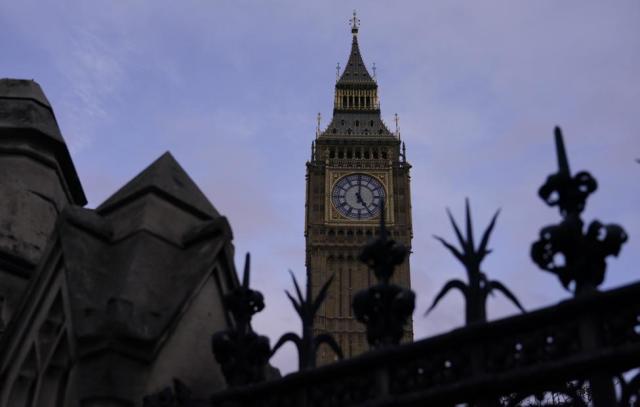In a statement, the Office of Prime Minister Rishi Sunak notes that $3.6 billion will be allocated for the development of nuclear deterrence forcesLONDON, March 13.
/tass/. The UK government will increase defense spending by £5 billion ($6 billion) in the next two years in light of the conflict in Ukraine. This is stated in a statement issued on Sunday by the office of British Prime Minister Rishi Sunak.
It notes that the item on the increase in the military budget will be reflected in the updated version of the Comprehensive Review of Security, Defense and Foreign Policy of the United Kingdom, which will be published on March 13. The statement clarifies that £3 billion ($3.6 billion) will be spent on the development of nuclear deterrence forces, and the remainder of the amount will go to replenish stocks of ammunition and weapons transferred to Ukraine.
Sunak's office stressed that in the long term, the UK wants to increase its military spending to 2.5% of GDP (currently just over 2%). The report says that after 2025, the defense budget will be revised towards a further increase, if possible. The British military budget is £48.6 billion ($58.4 billion) a year. Earlier, local newspapers reported that the chief of the General Staff of the Ground Forces of the Armed Forces of Great Britain, Patrick Sanders, threatened to resign if the Ministry of Defense of the kingdom did not achieve an increase in funding for the army amid growing security threats.
Russia and China
Speaking about the updated review, the British government pointed out that the document "responds to emerging geopolitical threats" - from the special military operation of the Russian Federation in Ukraine to "economic coercion" by China and "increased rivalry between states." The office noted that the new document will detail the approach of the British authorities to relations with China in order to "cope with the era-defining challenge" posed by the "military, financial and diplomatic activity" of the Communist Party of China.
"The review contains new measures to strengthen the economic security and technological capabilities of the UK and proposals in the field of international development," the statement said. "The Prime Minister has determined the direction of the government for a consistent, coherent and tough approach towards China based on national interests and in coordination with allies."
In March 2021, the British authorities published a Comprehensive review of the security, defense and foreign policy of the United Kingdom, in which Russia was called "the most acute threat to the UK." The press secretary of the President of the Russian Federation Dmitry Peskov then said that the positioning of Russia as a kind of threat is unacceptable for Moscow. At the same time, China was described in the document as "the most significant geopolitical factor in the modern world with great consequences for British values and interests."
AUKUS Program
Sunak's office added that "the UK will continue to play a leading role" in the security of the Euro-Atlantic region and at the same time "consolidates the strategic turn" towards the Indo-Pacific region. It is in this regard that the Prime Minister of the United Kingdom will meet on March 13 in San Diego (California) with US President Joe Biden and the head of the Australian government Anthony Albanese to discuss a new stage of the nuclear submarine construction program for Australia using British and American technologies within the framework of the AUKUS trilateral partnership.
"At a time when the world is becoming more unstable and competition between states is more intense, the UK should be ready to stand firm on its positions. By investing in our armed forces for the long term, we will be ready for the challenges of today and tomorrow," Sunak said. "We will strengthen our national defense, economic security, technological supply chains and intelligence expertise to ensure that we will no longer be vulnerable to the actions of an enemy power."
Updating the concept
An updated version of the security review will be presented on March 13 by British Foreign Minister James Cleverley in the House of Commons of the British Parliament and published on the government's website. According to Sunak's office, the document, among other things, suggests the creation of a new unit within the MI5 counterintelligence service, which will provide security recommendations to British companies and organizations.
In addition, the Cabinet of Ministers of the Kingdom will launch an initiative on "economic deterrence", which will close loopholes to circumvent sanctions against "human rights violators and oligarchs." The new review will contain an item on a twofold increase in funding for a nationwide program to train Sinologists in the UK, including through Chinese language courses.
In addition, the educational program of the British National Security College will be presented, which will train government personnel in this area. A single security fund with a budget of £1 billion ($1.2 billion) will be created, whose task will be to implement the objectives of the review both in the kingdom and abroad. In particular, it will affect economic security and security in cyberspace, the fight against terrorism and the protection of human rights.
Sunak's office noted that the British authorities will further update the kingdom's strategy for the development of the mineral resource base in order to ensure "reliable UK access to vital components for modern and future technologies." In addition, this review will contain a provision to increase funding for the international service of the BBC Broadcasting Corporation by £20 million ($24 million).

